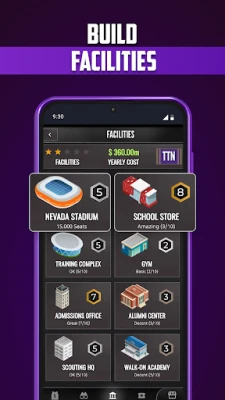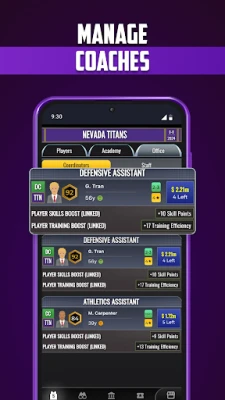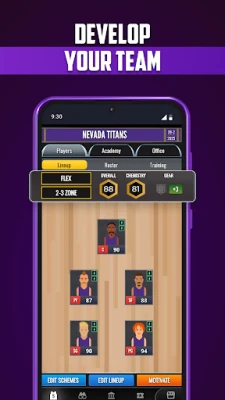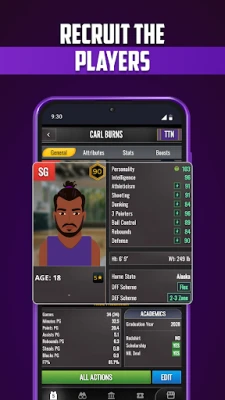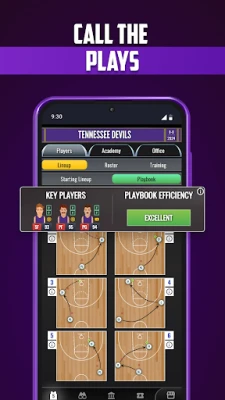
Latest Version
0.8.0
June 06, 2025
Games2rk
Games
Android
0
Free
com.gmz2rk.ucbc
Report a Problem
More About Ultimate College Basketball HC
Mastering College Basketball Management: Build Your Legacy
In the competitive world of college basketball, having complete control over day-to-day operations is essential for success. As a general manager, you have the unique opportunity to shape your program, develop talent, and create a legacy that will be remembered for years to come. This article will explore the key aspects of managing a college basketball program, from assembling a dream team to handling financial activities and maintaining expectations.
Manage Your Playbook Effectively
Your playbook is the foundation of your team's strategy. It’s crucial to develop a comprehensive playbook that not only outlines your game plan but also adapts to the strengths and weaknesses of your players. Regularly updating your playbook based on player performance and opponent analysis will keep your team competitive throughout the season.
Assemble Your College Basketball Dream Team
Building a successful team starts with recruiting the right players. Whether you’re scouting high school talent or utilizing the transfer portal, your goal is to assemble a roster filled with potential superstars. Focus on identifying players who not only possess skill but also fit your program's culture and values. Developing these players into superstars requires a commitment to their growth, both on and off the court.
Handle Coaches and Staff Hiring
The success of your program heavily relies on the coaching staff you assemble. Hiring experienced coaches who share your vision is vital. Look for individuals who can mentor players, develop strategies, and foster a positive team environment. Additionally, consider the importance of support staff, including trainers and analysts, who can enhance player performance and provide valuable insights.
Control Financial Activities Wisely
Managing the financial aspects of your program is crucial for sustainability. This includes budgeting for scholarships, facility upgrades, and operational costs. Establishing strong financial practices will allow you to invest in your program effectively, ensuring that you can attract top talent and maintain high standards.
Upgrade Your Program Facilities
Investing in facility upgrades can significantly impact your program's appeal. Modern training facilities, practice courts, and locker rooms can attract recruits and enhance player development. Prioritize improvements that will provide your athletes with the resources they need to excel, creating an environment that fosters success.
Sign Sponsors to Boost Your Program
Securing sponsorships is an essential part of building a successful college basketball program. Strong partnerships can provide financial support and resources that enhance your team's capabilities. Focus on building relationships with local businesses and national brands that align with your program's values and goals.
Handle Coach and Player Events
Organizing events for coaches and players is a great way to build team cohesion and engage with fans. From fundraisers to community outreach programs, these events can strengthen relationships and promote your program. Ensure that each event aligns with your overall strategy and enhances your program's visibility.
Maintain Expectations with School Presidents and Fans
Setting seasonal goals is crucial for maintaining the expectations of school presidents and fans. Clearly communicate your vision and objectives for the season, ensuring that everyone is aligned. Regularly update stakeholders on progress and celebrate achievements to keep morale high and maintain support.
Analyze In-Depth College Basketball Player Career Stats
Utilizing in-depth player statistics is essential for making informed decisions. Analyze performance metrics to identify strengths and areas for improvement. This data-driven approach will help you make strategic choices regarding player development, game strategies, and recruitment.
Recognize Yearly Player Awards
Celebrating player achievements through yearly awards fosters a culture of excellence within your program. Recognize outstanding performances, both on and off the court, to motivate players and build a sense of pride in your program. These awards can also enhance your program's reputation and attract future talent.
Superstar Players or Bargains: The Recruitment Dilemma
When it comes to building your roster, you face a critical decision: invest in superstar players or seek out hidden gems. Each approach has its merits. Superstar players can elevate your program's profile, while raw talent from high school graduates can be developed into future stars. Weigh the pros and cons of each strategy to determine the best fit for your program.
Recruiting External Coordinators vs. Developing Internal Talent
Another key decision is whether to recruit external coordinators or invest in developing your existing staff. While bringing in new talent can provide fresh perspectives, nurturing your current coaches can lead to a more cohesive program. Consider the long-term benefits of building a strong internal team that understands your vision and goals.
Fulfill Your Destiny as a Legendary General Manager
Ultimately, the choices you make as a general manager will shape your program's future. Embrace the challenge of building a long-lasting basketball franchise that dominates the league. Your program is not just a team; it’s your legacy. With dedication, strategic planning, and a commitment to excellence, you can create a powerhouse that will be remembered for generations.
In conclusion, managing a college basketball program requires a multifaceted approach. From assembling a dream team to handling finances and maintaining expectations, every decision you make contributes to your program's success. Take control, make informed choices, and watch your legacy unfold on the court.
Rate the App
User Reviews
Popular Apps










Editor's Choice












